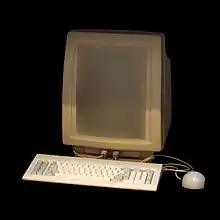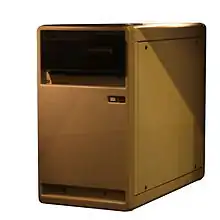Lilith (computer)
The DISER Lilith is a custom built workstation computer based on the AMD 2901 bit-slice processor, created by a group led by Niklaus Wirth at ETH Zürich.[1][2] The project started in 1977 and by 1984 several hundred workstations were in use. It had a high resolution full page display, a mouse, a laser printer interface, and a network interface. Its software was written completely in Modula-2 and included a relational database program called Lidas.


Citing from Sven Erik Knudsen's contribution to "The Art of Simplicity": "Lilith's clock speed was around 7 MHz and enabled Lilith to execute between 1 and 2 million instructions (called M-code) per second. (...) Initially, the main memory was planned to have 65,536 16-bit words memory, but soon after its first version, it was enlarged to twice that capacity. For regular Modula-2 programs, however, only the initial 65,536 words were usable for storage of variables."[3]
History
The development of Lilith was influenced by the Xerox Alto from the Xerox PARC (1973) where Niklaus Wirth spent a sabbatical from 1976 to 1977. Unable to bring back one of the Alto systems to Europe, Wirth decided to build a new system from scratch between 1978 and 1980, selling it under the company name DISER (for Data Image Sound Processor and Emitter Receiver System).[4] In 1985 he had a second sabbatical leave to PARC, which led to the design of the Oberon System. Ceres, the follow-up to Lilith, was also released in 1985.
The mouse of the Lilith was custom-designed, and later used with the Smaky computers. It would go on to inspire the first mice produced by Logitech.
See also
- Kronos, a Soviet clone of the Lilith
References
- Richard Ohran: Lilith and Modula-2. BYTE August, 1984. pp.181-192 Reprint
- Paul A. Sand: The Lilith Personal Computer. BYTE September, 1984. pp.300–311 Reprint
- The School of Niklaus Wirth "The Art of Simplicity" by László Böszörményi, Jürg Gutknecht, Gustav Pomberger (Ed.), 2000, Morgan Kaufmann ISBN 1-55860-723-4 & dpunkt, ISBN 3-932588-85-1
- Niklaus Wirth A Brief History of Modula and Lilith The ModulaTor, Nr. 0, January 1995
External links
| Wikimedia Commons has media related to Diser Lilith. |
- Documentation on BitSavers
- Geissman, L et al. (August 1982) Lilith Handbook
- Knudsen, S (1983) Medos-2: A Modula-2 Oriented Operating System for the Personal Computer Lilith
- Wirth, N (1981) The Personal Computer Lilith
- Emulith emulator for the Lilith, homepage and documentation
- Lilith and Modula-2
- ETHistory - Lilith Workstation
- AMD AM2901DC entry on CPU World